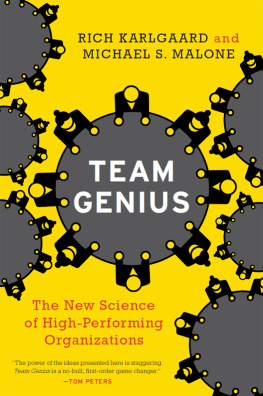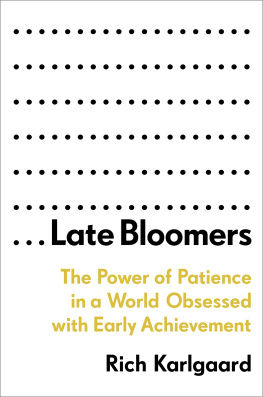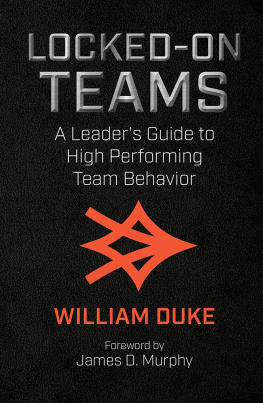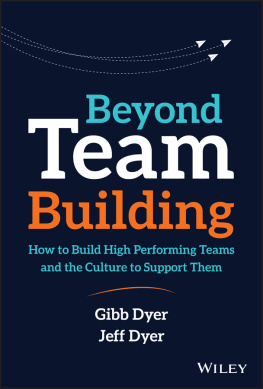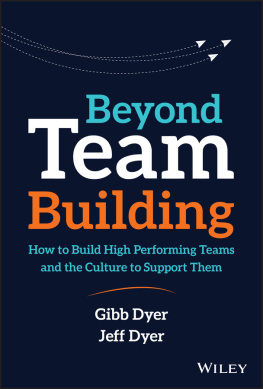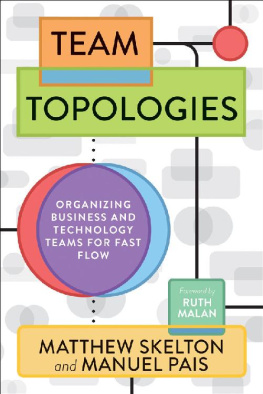Rich Karlgaard - Team Genius: The New Science of High-Performing Organizations
Here you can read online Rich Karlgaard - Team Genius: The New Science of High-Performing Organizations full text of the book (entire story) in english for free. Download pdf and epub, get meaning, cover and reviews about this ebook. year: 2015, publisher: HarperBusiness, genre: Business. Description of the work, (preface) as well as reviews are available. Best literature library LitArk.com created for fans of good reading and offers a wide selection of genres:
Romance novel
Science fiction
Adventure
Detective
Science
History
Home and family
Prose
Art
Politics
Computer
Non-fiction
Religion
Business
Children
Humor
Choose a favorite category and find really read worthwhile books. Enjoy immersion in the world of imagination, feel the emotions of the characters or learn something new for yourself, make an fascinating discovery.
- Book:Team Genius: The New Science of High-Performing Organizations
- Author:
- Publisher:HarperBusiness
- Genre:
- Year:2015
- Rating:3 / 5
- Favourites:Add to favourites
- Your mark:
Team Genius: The New Science of High-Performing Organizations: summary, description and annotation
We offer to read an annotation, description, summary or preface (depends on what the author of the book "Team Genius: The New Science of High-Performing Organizations" wrote himself). If you haven't found the necessary information about the book — write in the comments, we will try to find it.
A groundbreaking book that sheds new light on the vital importance of teams as the fundamental unit of organization and competition in the global economy.
Teamswe depend on them for both our professional success and our personal happiness. But isnt it odd how little scrutiny we give them? The teams that make up our lives are created mostly by luck, happenstance, or circumstancebut rarely by design. In trivial matterssay, a bowling team, the leadership of a neighborhood group, or a holiday party committeesuccess by serendipity is already risky enough. But when it comes to actions by fast-moving start-ups, major corporations, nonprofit institutions, and governments, leaving things to chance can be downright dangerous.
Offering vivid reports of the latest scientific research, compelling case studies, and great storytelling, Team Genius shows managers and executives that the planning, design, and management of great teams no longer have to be a black art. It explores solutions to essential questions that could spell the difference between success and obsolescence. Do you know how to reorganize your subpar teams to turn them into top performers? Can you identify which of the top-performing teams in your company are reaching the end of their life span? Do you have the courage to shut them down? Do you know how to create a replacement team that will be just as effectivewithout losing time or damaging morale? And, most important, are your teams the right size for the job?
Throughout, Rich Karlgaard and Michael S. Malone share insights and real-life examples gleaned from their careers as journalists, analysts, investors, and globetrotting entrepreneurs, meeting successful teams and team leaders to reveal some new truths:
- The right team size is usually one fewer person than what managers think they need.
- The greatest question facing good teams is not how to succeed, but how to die.
- Good chemistry often makes for the least effective teams.
- Cognitive diversity yields the highest performance gainsbut only if you understand what it is.
- How to find the bliss point in team intimacyand become three times more productive.
- How to identify destructive team members before they do harm.
- Why small teams are 40 percent more likely to create a successful breakthrough than a solo genius is.
- Why groups of 7 ( 2), 150, and 1,500 are magic sizes for teams.
Eye-opening, grounded, and essential, Team Genius is the next big idea to revolutionize business.
Rich Karlgaard: author's other books
Who wrote Team Genius: The New Science of High-Performing Organizations? Find out the surname, the name of the author of the book and a list of all author's works by series.

